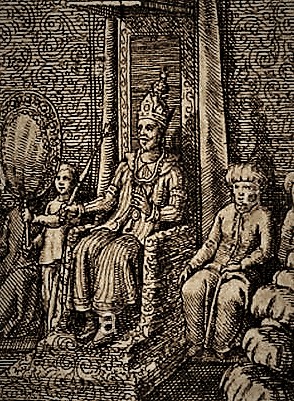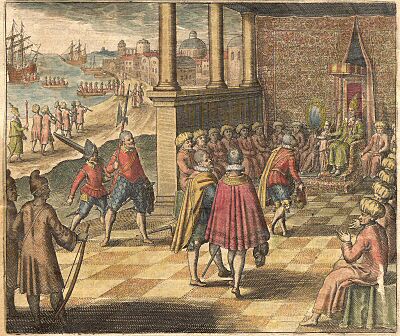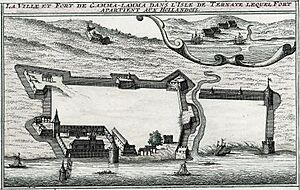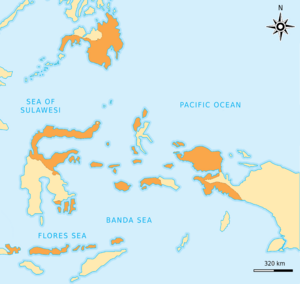Babullah of Ternate facts for kids
Quick facts for kids Babullah |
|||||
|---|---|---|---|---|---|

Sultan Babullah, 1579
|
|||||
| Sultan of Ternate | |||||
| Reign | 1570–1583 | ||||
| Predecessor | Hairun Jamilu | ||||
| Successor | Saidi Berkat | ||||
| Born | 10 February 1528 (?) | ||||
| Died | July 1583 (aged 55) | ||||
|
|||||
| Father | Hairun Jamilu | ||||
| Mother | Boki Tanjung | ||||
| Religion | Sunni Islam | ||||
| Signature |  |
||||
Sultan Babullah (Jawi: سلطان باب الله; born February 10, 1528 (?), died July 1583) was a powerful ruler. He was the 7th Sultan of Sultanate of Ternate in the Maluku Islands. He ruled from 1570 to 1583. Sultan Babullah is known as the greatest Sultan in the history of Ternate and Maluku. He famously defeated the Portuguese who had occupied Ternate. Under his leadership, the Sultanate reached its most successful period in the late 1500s.
Sultan Babullah was often called the Ruler of 72 Islands. These islands were in eastern Indonesia. They included most of the Maluku Islands, Sangihe, and parts of Sulawesi. His influence reached as far as Solor, East Sumbawa, Mindanao, and the Papuan Islands. During his rule, there was free trade in spices and forest products. This made Maluku very important in trade across Asia.
Contents
Early Life and Training
Babullah was likely born on February 10, 1528. He was a prince, or Kaicili, and the oldest son of Sultan Hairun (who ruled from 1535–1570). His mother was Boki Tanjung from Bacan.
Not much is known about his early years. However, his father made sure he received religious training. He learned a lot about the Qur'an. Prince Babullah and his brothers were also trained by an Islamic scholar and a military expert. This taught them about both religion and warfare. He even went with his father when he was in exile in Goa for a time. Later, he helped his father manage the government.
Ternate was a key place for the clove trade. Since 1522, the Portuguese had a strong influence there. They built a stone fort on the island. At first, Ternate's leaders worked with the Portuguese. The Portuguese had better weapons and controlled the important trading city of Melaka. But soon, the Portuguese commanders and soldiers caused a lot of anger.
Sultan Hairun had a difficult relationship with the Portuguese. Still, they helped him defeat other sultanates in North Maluku. In the 1560s, a conflict started between Ternate and the Portuguese. Muslims in Ambon asked Sultan Hairun for help. The Portuguese were trying to convert people on Ambon to Christianity. Sultan Hairun sent a war fleet led by Prince Babullah. In 1563, Babullah's fleet appeared at a Christian village and demanded it surrender. But the siege ended when three Portuguese ships arrived.
Babullah also led an expedition to northern Sulawesi in 1563. He wanted to bring these lands under his father's rule. The Portuguese knew this would spread Islam. They tried to convert people in places like Menado to Christianity.
Despite these fights, Ternate and Portugal still had some ties. In 1569, Prince Babullah joined a Portuguese expedition to the Philippines. He brought fifteen korakoras (large boats). However, Ternate was not very interested in this mission. Babullah instead took his fleet to the Melaka Straits and engaged in piracy. He was unhappy that his father was too easy on the Europeans.
The Death of Sultan Hairun
Sultan Hairun's power grew each year, which worried the Portuguese. His forces attacked Portuguese-controlled areas in Halmahera. He controlled the sea routes, stopping food from reaching the Portuguese fort in Ternate. In 1570, Captain Diogo Lopes de Mesquita invited Hairun to the São João Baptista fortress. This was supposedly to discuss an urgent matter.
On February 25, 1570, the Sultan went to the fort alone. His bodyguards were not allowed inside. As the Sultan was leaving, a nephew of the captain, Martim Afonso Pimentel, stabbed him. The Sultan died. Mesquita thought that by killing Hairun, Maluku would lose its leader. But he was wrong. The anger against the Portuguese had grown strong, especially through Prince Babullah.
Sultan Babullah Takes Power
Becoming Sultan
Sultan Hairun's death made the people of Ternate and other Maluku kings very angry. The royal council and other leaders met on Hiri island. They chose Prince Babullah as the new Sultan of Ternate. He took the title Sultan Babullah Datu Syah.
The new Sultan vowed to fight the Portuguese. He wanted to bring back the power of Islam in Maluku. He also aimed to make the Ternate Sultanate a strong kingdom and force the Portuguese out.
A Call to Action
Sultan Babullah acted quickly after becoming ruler. He declared a strong vow of war against the Portuguese. This was like a holy war, or Jihad, against the Christians. Like his father, he was good at bringing different groups together. To make his position stronger, Sultan Babullah married the sister of Sultan Gapi Baguna of Tidore.
Many Malukan kings put aside their rivalries. They joined forces under Sultan Babullah and Ternate. Rulers and chiefs from a wider region also joined him. Sultan Babullah had many skilled commanders. These included the King of Jailolo and the sea lord Kapita Rubohongi. Spanish sources say Sultan Babullah could gather 133,300 soldiers. These soldiers came from a huge area, from Sulawesi to New Guinea. This would mean a navy of about 2,000 korakoras. These numbers show how powerful and respected he was.
Expelling the Portuguese
After Hairun's murder, Sultan Babullah demanded that Lopes de Mesquita be handed over. Portuguese forts in Ternate, like Tolucco and Saint Lucia, quickly fell. Only the São João Baptista Citadel remained. Babullah's forces surrounded São João Baptista. They cut off its food supply, leaving the people inside with very little to eat.
The Portuguese inside the fort got a new captain, Alvaro de Ataide. But this did not change Babullah's plan to remove the Europeans.
Sultan Babullah's forces attacked areas in northern Halmahera and Morotai. These were places where the Jesuit mission had made progress. This caused a lot of damage. The Christian ruler of Bacan was forced to become Muslim again around 1575. The Sultan also took the fight to Ambon. The Portuguese had built a fortress there in 1569. In 1570, a Ternate fleet attacked Ambon. The Ternatans took control of many islands, including Hoamoal and Buru Island. The Portuguese struggled to keep their fortress and lost much control over the clove trade.
By 1575, most Portuguese positions in Maluku had fallen. The São João Baptista fortress was still under siege. For five years, the Portuguese and their families suffered inside the castle. Sultan Babullah finally gave them an ultimatum: leave Ternate within 24 hours. Local people who had married Portuguese were allowed to stay if they became royal subjects. The Portuguese captain accepted these terms.
This was a huge victory for the people of what is now Indonesia. It was the first major win against a Western power. It delayed Western colonization in the East Indies for many years.
On July 15, 1575, the Portuguese left Ternate. Babullah kept his word, and no one was harmed. He made it clear that Portuguese merchants could still come to Ternate. The prices for cloves would also stay the same. A small group of Portuguese had to stay in Ternate as hostages. A Portuguese relief fleet took most of the others to Ambon. Some went to Malacca, while others went to Solor and Timor. There, they traded in sandalwood for the next 400 years.
Visit from Francis Drake
On November 3, 1579, Sultan Babullah welcomed Francis Drake. Drake was a famous English sailor and adventurer. He and his crew were sailing around the world. They arrived in Ternate after crossing the Pacific. Drake described Babullah as a tall, strong man with a royal and kind face.
Babullah greeted his guests warmly. He went out with a fleet of boats to meet them. The Sultan declared his lasting friendship with Queen Elizabeth. He likely wanted to use the English against the Portuguese. This meeting was an early step in diplomatic relations between Indonesia and the United Kingdom. However, Drake did not agree to join a campaign against the Portuguese fort in Tidore.
After their first talks, Babullah sent a grand meal to Drake and his men. It included rice, chicken, sugar canes, fruits, and coconuts. Sultan Babullah and Francis Drake respected each other. Drake was impressed by how much Babullah's people respected him. Before leaving Ternate in November, Drake received a message for the Queen. It came with a ring, showing Babullah's wish for an alliance. Drake took some high-quality cloves with him.
Francis Drake's Description
Francis Drake's report describes the meeting in detail. He wrote that while his men waited for the Sultan, they saw many noble figures. These were the king's personal advisers. There were also young, elegant people. Outside, there were four older men in long red robes. They were called "Romans" or "foreigners" and helped with trade. There were also two Turks, one Italian, and one Spaniard. The Spaniard had been freed by the Sultan from the Portuguese.
Drake described the Sultan's arrival: "The King finally came from the castle, with 8 or 10 senators following him. He was shaded by a very luxurious canopy with gold ornaments. He was guarded by 12 spears. Our people, with the Sultan's brother, stood to meet him. He welcomed them kindly. He spoke softly, with a calm voice, showing the elegance of a Sultan. His clothes were like others in his country, but much more luxurious. From his waist to the ground, he wore very rich gold-embroidered cloth. His legs were bare, but he wore red velvet shoes. His headwear was covered with gold-plated rings, like a crown. On his neck, he wore a chain of pure gold. On his left hand, he had a diamond, an emerald, a ruby, and turquoise stones. On his right hand, he had a large turquoise stone and other smaller diamonds."
"He sat on his throne. On his right, a servant fanned him with a very expensive fan. This was to cool the Sultan, as it was very hot. After some time, the gentlemen gave their message and received an answer. They were then allowed to leave. One of the Sultan's council members safely brought them back."
Ternate's Golden Age
After the Portuguese left, Sultan Babullah made São João Baptista his own fortress and palace. He improved the fort and renamed it Gammalamo. Under Babullah, trading fleets from Melaka continued to arrive in Ternate. This kept trade flowing with Europe and the rest of the world. Western merchants were treated like traders from other countries. They were watched closely. Sultan Babullah even made a rule that every European arriving in Ternate had to remove their hats and shoes. This was to remind them of their place.
Sultan Babullah built strong alliances with other rulers in Indonesia. Muslim groups from the port kingdoms of Java became Ternate's allies. Babullah often visited areas claimed by Ternate. He asked for their loyalty to his policies. In 1580, Babullah led a large naval expedition (hongi). He visited many places in Sulawesi. He also met the king of Gowa, Karaeng Karobo. The two rulers made an alliance. Babullah invited Karaeng Karobo to become Muslim. Ternate tradition says the king accepted Islam, but other sources say Gowa became Muslim later. As a sign of their new bond, Sultan Babullah built a fortress called Somba Opu on the Gowa coast. His fleet then conquered Selayar south of Sulawesi.
Under Sultan Babullah, the Sultanate of Ternate reached its greatest glory. Islamic influence, the effects of the Portuguese presence, and rising clove sales all helped. Royal control over territories and spices grew stronger. Early in his rule, the Sultan sent fleets to conquer Buru, Ceram, and parts of Ambon. During the 1580 expedition, chiefdoms in North Sulawesi also came under his rule. Local stories say Ternate gained influence by helping in local power struggles and through marriages. For example, King Humonggilu of Limboto asked for Ternate's help. He then married Babullah's sister.
During the 1580 expedition, Banggai, Tobungku, Tiworo, and Buton also came under the Sultan's control. Ternate's influence also reached the Solor Islands near Timor. This gave them access to Timorese sandalwood. They also influenced the nutmeg-producing Banda Islands. Later Spanish records also mention Mindanao, the Papuan Islands, and the Sumbawan kingdoms of Bima and Kore. These places were probably only loosely connected to Ternate. While some areas paid tribute, others were ruled by deputies appointed by the Sultan. These deputies were called Sangaji.
Babullah was nicknamed Ruler of 72 Islands. This was mentioned by the Dutch historian François Valentijn. At this time, the Ternate sultanate was the largest Islamic kingdom in eastern Indonesia.
Continued Fights
Sultan Babullah's rule was not without challenges. The Sultan of Tidore, Gapi Baguna, had supported Babullah. But he became worried about Ternate's growing power. In 1576, he went to Ambon to make an alliance with the Portuguese. On his way back, a Ternate fleet captured him. He was later freed by his relative. Gapi Baguna then allowed the Portuguese to build a fort on Tidore in 1578. He hoped this would attract clove trade and give him military support against Ternate.
In 1581, Portugal joined with Spain. This meant the Spanish and Portuguese areas in Asia were supposed to stay separate. The Portuguese wanted to keep peace with Babullah. They even convinced him not to make a deal with the Spanish in Manila. However, forces from the Spanish Philippines soon came to help the Portuguese in Maluku. A Spanish force arrived in Tidore in 1582. They tried to weaken Babullah by attacking Ternate. But the Spaniards got sick from an epidemic. They had to return to Manila without achieving much. The full impact of the Spanish power was felt by Babullah's successor, Saidi Berkat, in 1606.
Muslim Diplomacy
Sultan Babullah continued his father's plan to connect with other Muslim states far away. Around 1570, Muslim states in South India and Aceh attacked Portuguese areas. They had support from the Ottoman Empire. This was likely connected to Babullah's efforts. All these attacks were defeated by the Portuguese, except in Maluku.
Babullah sent his envoy, Kaicili Naik, to Lisbon. There, he met Philip II of Spain and Portugal. He demanded that Hairun's murderer be punished. The talks did not lead to a clear result. However, the main goal of the trip was to make alliances with Islamic rulers in Brunei, Aceh, and Java. When Kaicili Naik finally returned to Ternate, Babullah had already died.
People from the Ottoman Empire stayed at Babullah's court. The Portuguese were worried about close ties with Muslim leaders from Aceh, the Malay World, and even Mecca. The Sultan received some long Turkish guns as a valuable gift. Javanese from Jepara also helped Ternate. These far-reaching contacts show the busy trade routes that had grown across Asia since the 1400s. These routes also carried religious and cultural connections. Islam had been present in Maluku, but during Babullah's time, religious practices became stronger. This was partly a response to the aggressive Catholic efforts.
Ternate After Babullah
Sultan Babullah died in July 1583. The exact cause and place of his death are not certain. Some stories say he was tricked onto a Portuguese ship and captured. They say he was taken towards Goa but died at sea. Other stories claim he was killed at home by poison or magic. A writer from that time simply said he died of a serious illness.
No matter how he died, Babullah was a strong and inspiring leader. His death left a big gap that his successors could not fully fill. In Indonesian history, he was the only major leader before the 1900s to win a complete victory over a Western power. He made Ternate a large and successful kingdom in the late 1500s. He also gave his people confidence to rise up against a foreign power trying to control their lives. After Sultan Babullah, no other leaders in Ternate matched his skill. When new Spanish and Dutch forces arrived in the early 1600s, Ternate was not strong enough to resist them.
Sultan Babullah was followed by his son, Sultan Saidi Berkat (who ruled from 1583–1606). Saidi continued to fight against the Portuguese and Spanish with mixed results.
Family
Sultan Babullah Datu Syah had several known wives:
- Bega, from the Sula Islands, mother of Saidi.
- Owutango, a legendary princess from the Tomini Bay, mother of Saharibulan.
His known children included:
- Sultan Saidi Berkat (c. 1563–1628), who ruled Ternate from 1583–1606.
- Saharibulan, mentioned in North Sulawesi stories.
- Boki Ainalyakin, who married Kodrat, Sultan of Jailolo.
- Boki Randangagalo, who married a Sultan of Tidore, and later a Sultan of Bacan.
- A daughter, who married a Sangaji of Motir.
Images for kids
-
A clove tree as depicted in Cristóbal Acosta, Tractado de las drogas y medicinas de las Indias orientales, 1578.
-
Native soldier from Maluku, the Boxer Codex, late 16th century.
See Also
- Spice trade
- List of rulers of Maluku
- Sultanate of Ternate
- Sultanate of Jailolo
- Sultanate of Tidore
|
Babullah of Ternate
|
||
| Preceded by Hairun |
Sultan of Ternate 1570–1583 |
Succeeded by Saidi Berkat |
 | Delilah Pierce |
 | Gordon Parks |
 | Augusta Savage |
 | Charles Ethan Porter |








